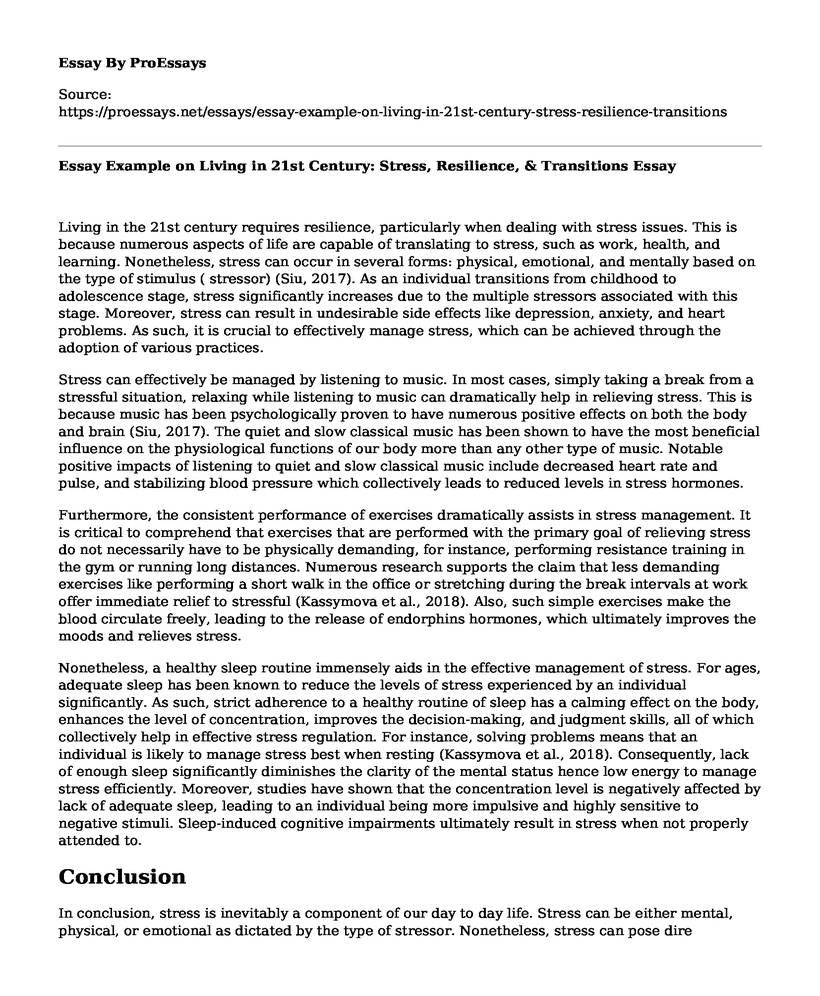Living in the 21st century requires resilience, particularly when dealing with stress issues. This is because numerous aspects of life are capable of translating to stress, such as work, health, and learning. Nonetheless, stress can occur in several forms: physical, emotional, and mentally based on the type of stimulus ( stressor) (Siu, 2017). As an individual transitions from childhood to adolescence stage, stress significantly increases due to the multiple stressors associated with this stage. Moreover, stress can result in undesirable side effects like depression, anxiety, and heart problems. As such, it is crucial to effectively manage stress, which can be achieved through the adoption of various practices.
Stress can effectively be managed by listening to music. In most cases, simply taking a break from a stressful situation, relaxing while listening to music can dramatically help in relieving stress. This is because music has been psychologically proven to have numerous positive effects on both the body and brain (Siu, 2017). The quiet and slow classical music has been shown to have the most beneficial influence on the physiological functions of our body more than any other type of music. Notable positive impacts of listening to quiet and slow classical music include decreased heart rate and pulse, and stabilizing blood pressure which collectively leads to reduced levels in stress hormones.
Furthermore, the consistent performance of exercises dramatically assists in stress management. It is critical to comprehend that exercises that are performed with the primary goal of relieving stress do not necessarily have to be physically demanding, for instance, performing resistance training in the gym or running long distances. Numerous research supports the claim that less demanding exercises like performing a short walk in the office or stretching during the break intervals at work offer immediate relief to stressful (Kassymova et al., 2018). Also, such simple exercises make the blood circulate freely, leading to the release of endorphins hormones, which ultimately improves the moods and relieves stress.
Nonetheless, a healthy sleep routine immensely aids in the effective management of stress. For ages, adequate sleep has been known to reduce the levels of stress experienced by an individual significantly. As such, strict adherence to a healthy routine of sleep has a calming effect on the body, enhances the level of concentration, improves the decision-making, and judgment skills, all of which collectively help in effective stress regulation. For instance, solving problems means that an individual is likely to manage stress best when resting (Kassymova et al., 2018). Consequently, lack of enough sleep significantly diminishes the clarity of the mental status hence low energy to manage stress efficiently. Moreover, studies have shown that the concentration level is negatively affected by lack of adequate sleep, leading to an individual being more impulsive and highly sensitive to negative stimuli. Sleep-induced cognitive impairments ultimately result in stress when not properly attended to.
Conclusion
In conclusion, stress is inevitably a component of our day to day life. Stress can be either mental, physical, or emotional as dictated by the type of stressor. Nonetheless, stress can pose dire consequences to the health of the victim. It is almost impossible to eliminate stress as an aspect of our life. However, numerous methods can be developed to ensure that stress is managed to considerably low levels.
References
Siu, O. L. (2017). Stress management techniques in the workplace. In The Routledge Companion to Wellbeing at Work (pp. 284-297). Routledge. https://books.google.co.ke/
Kassymova, K., Kosherbayeva, N., Sangilbayev, S., & Schachl, H. (2018, September). Stress management techniques for students. In International Conference on the Theory and Practice of Personality Formation in Modern Society (ICTPPFMS 2018). Atlantis Press. https://doi.org/10.2991/ictppfms-18.2018.10
Cite this page
Essay Example on Living in 21st Century: Stress, Resilience, & Transitions. (2023, Aug 08). Retrieved from https://proessays.net/essays/essay-example-on-living-in-21st-century-stress-resilience-transitions
If you are the original author of this essay and no longer wish to have it published on the ProEssays website, please click below to request its removal:
- The Power of Story - Social Media in My Life
- Research Paper on Sociopathic Personalities
- Intercultural Communication in "The Gods Must be Crazy" Film Essay
- Essay Sample on Reasons Why It Is Becoming Easier to Trust Strangers by Rachel Botsman
- Research Paper on Effects of Aging and Mitral Valve Prolapse
- Essay Example on Indigenous Communities: Addressing Social Issues through Culturally Driven Approaches
- Free Paper on Maskwacis Crime Crisis: Causes, Interventions, and the Road Ahead







